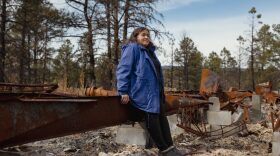One of the state's most diverse electorates is in the 3rd Congressional District, stretching from the Navajo Nation in the northwest corner to the Permian Basin in the southeast. It takes in Santa Fe along with many pueblos and historic, majority-Hispanic communities.
In this election, Democratic incumbent Teresa Leger Fernández faces a challenge from Republican Sharon Clahchischillage, with the candidates disagreeing sharply (if cordially) on the environment, reproductive rights and gun control.
During two terms in Congress, Leger Fernández has perhaps been most prominent for her work to pass legislation to bring billions in federal money to New Mexico to compensate the victims of the catastrophic Calf Canyon/Hermit’s Peak fire.
In an interview with KUNM, she said the fires, which were exacerbated by forests being stressed by drought, reinforced the urgency of addressing climate change.
"We are a fragile landscape, so we need to make sure we address the climate crisis, because we cannot suffer the droughts, we cannot suffer the wildfires," she said.
She pointed to the Bipartisan Infrastructure Law, passed during her time in office, and its intent to address climate change. She also criticized the US Supreme Court for restricting the Environmental Protection Agency's ability to regulate waterways, among other rulings.
"We need to do more to combat what the Supreme Court has done with regards to attacking our Clean Water Act, and we need to push back on efforts to undermine our EPA," she said.
She added she supported renewable energy, and pointed to a recent federal grant of $156 million for solar in low-income households in New Mexico. But she seemed to stop short of calling for an end to oil and gas production any time soon, instead calling for more regulation.
"I think that there are ways in which we can bring down greenhouse gas emissions in New Mexico's industries, including in the dairy farms, including in our oil and gas patch, there are ways in which we can reduce methane in those areas, and we need to," she said.
Her opponent, Republican Sharon Clahchischilliage, is a former state lawmaker and current member of the state Public Education Commission. She is a member of the Navajo Nation, and told KUNM that the state can't afford to transition away from fossil fuels.
"If we diminish oil and gas, we're going to lose so much," she said.
She added in her conversations with people like farmers and ranchers in the district, many resent conservation or environmental regulations.
"The biggest concern is outside people coming in, trying to determine what we should do for our environment," she said.
In a candidate forum held Monday by the League of Women Voters and streamed by the Santa Fe New Mexican, Clahchischilliage said, "climate change has been going on for decades, for centuries, and all of a sudden we’re we’re saying that carbon emission, we’re saying that gasoline, we’re talking about electricity, is causing climate change. Not so. The earth is cleansing itself."
She did not offer any evidence. Greenhouse gas emissions are causing the planet to warm rapidly, is the overwhelming consensus of scientists.
Clahchischilliage's stance on reproductive rights is simple.
"I don't support abortion, period," she said. Nor does she support access to gender-affirming care.
"I can't support that now, because there are too many questions about it, the issues need to be resolved first before I know what I can support," she said.
Leger Fernández has been deeply critical of the Supreme Court's overturning of Roe v Wade, saying it "not only stripped away a woman's right to choose but ripped away our right to privacy".
About 42% of her constituents are Hispanic, some of whom hold conservative views on abortion, but the Congresswoman said most of them support abortion access.
"We know that New Mexican Hispanos are in support of a woman's right to make the decision about her health care, including abortion, with her own faith, her own familia and her own doctors without governmental interference," she said.
That might not be universal, she conceded.
"Now that doesn't mean 100%, right, but high 60% or so, and that's a pretty good number," she said. She did not cite specific polls. A 2022 Pew survey found 57% of Hispanic people nationwide supported abortion access in all or most cases.
Another area where the candidates differ sharply is on gun policy. Clahchischilliage says the priority is to address crime, to prosecute and imprison more people. Leger Fernández said in the candidate forum that she comes from a family of hunters but would support an assault weapon ban.
Leger Fernández is significantly ahead in polls and fundraising. An Emerson College poll in August put support for Leger Fernández at 52% and support for Clahchischilliage at 39%. The most recent data on the candidates' finances from the Federal Election Commission found that Leger Fernández had raised more than $1.6m for her campaign, while Clahchischilliage had raised just over $50,000.





